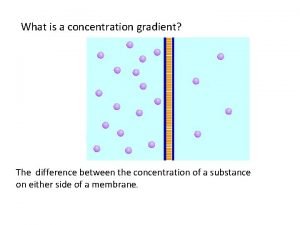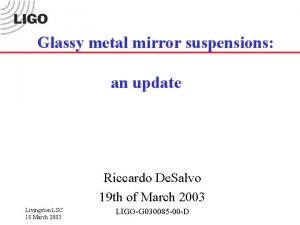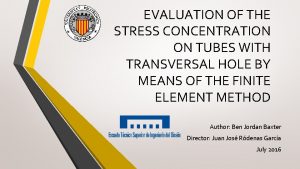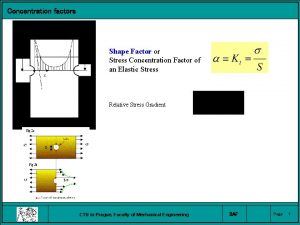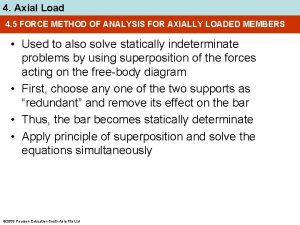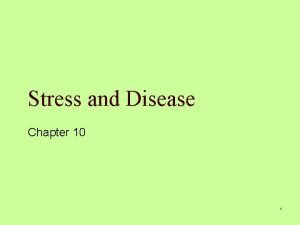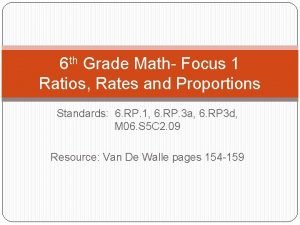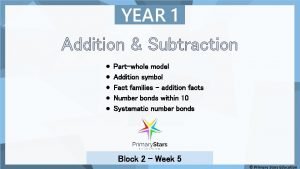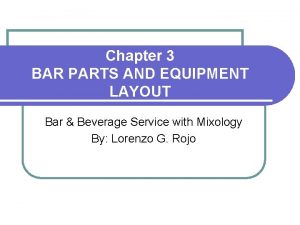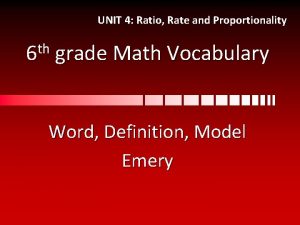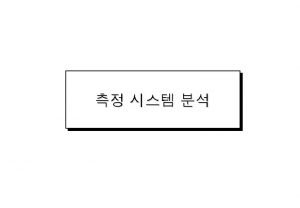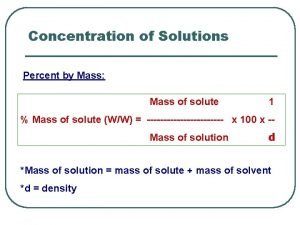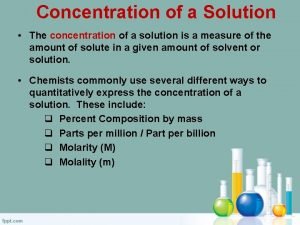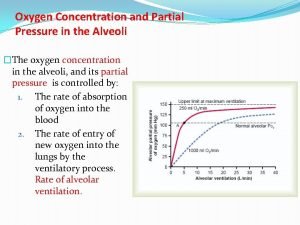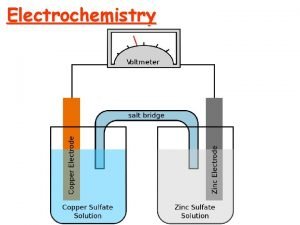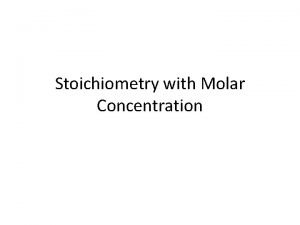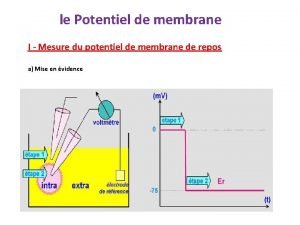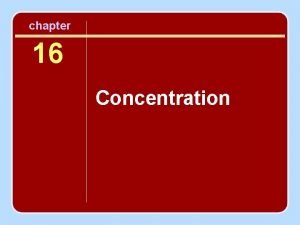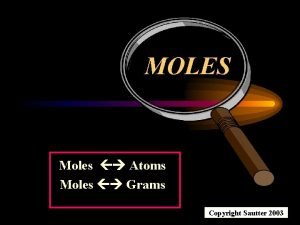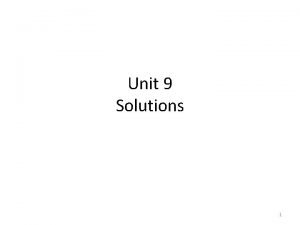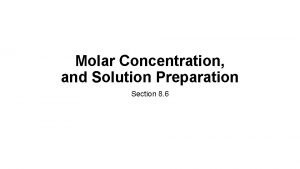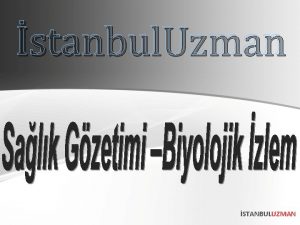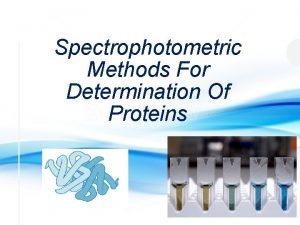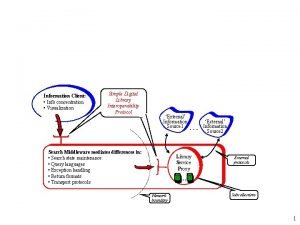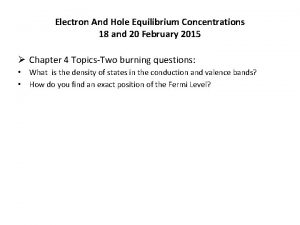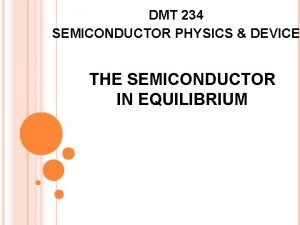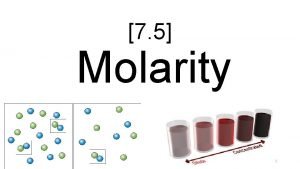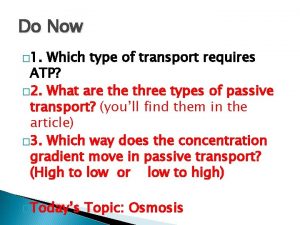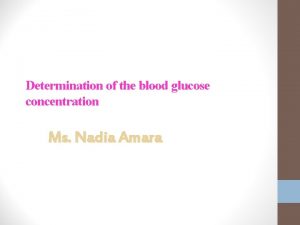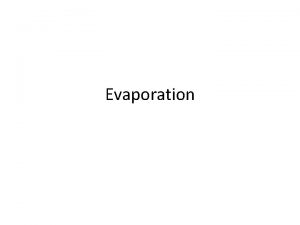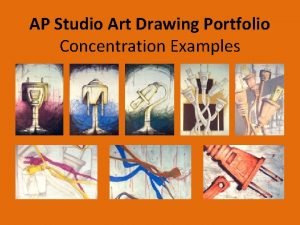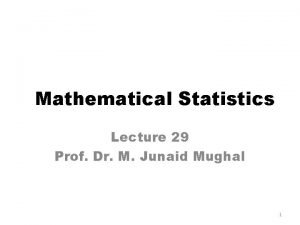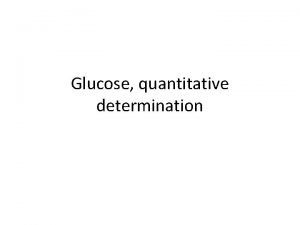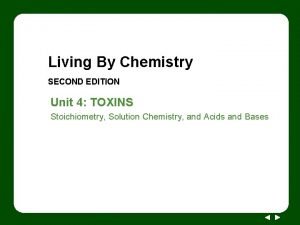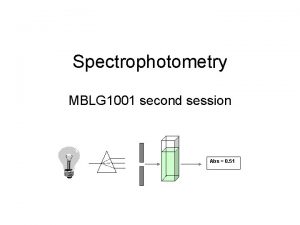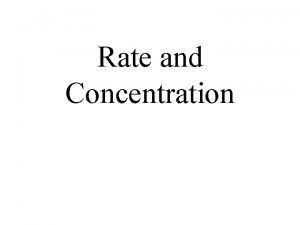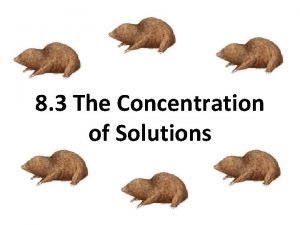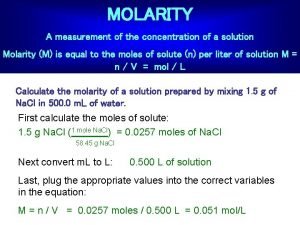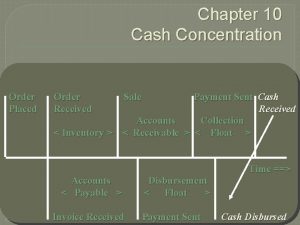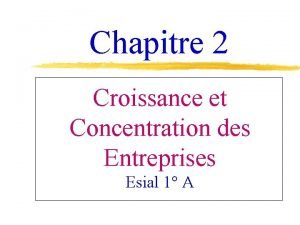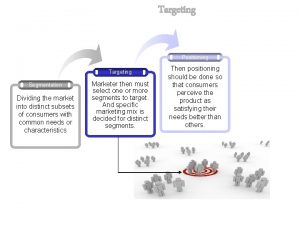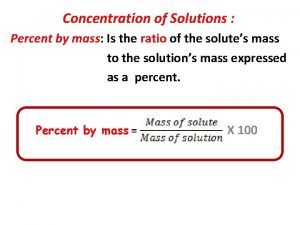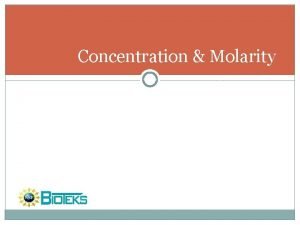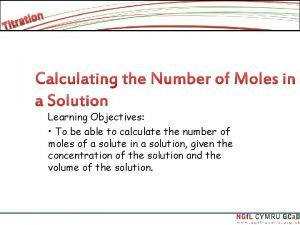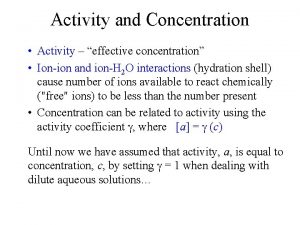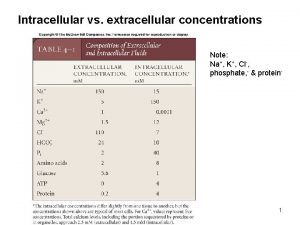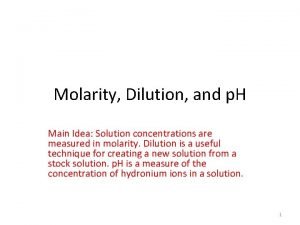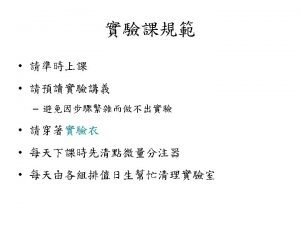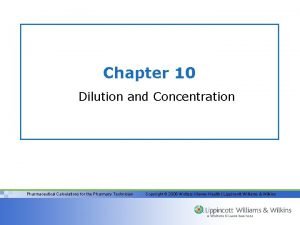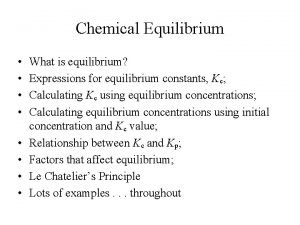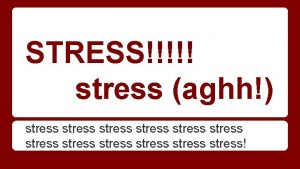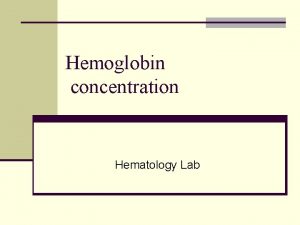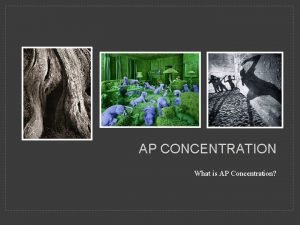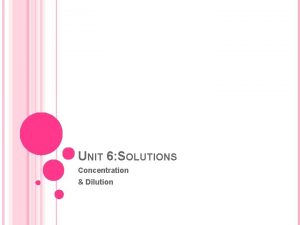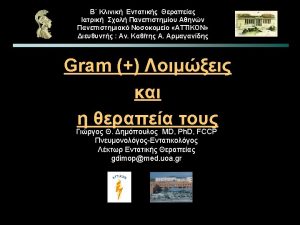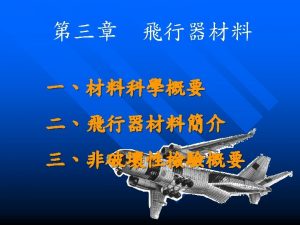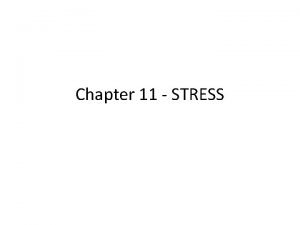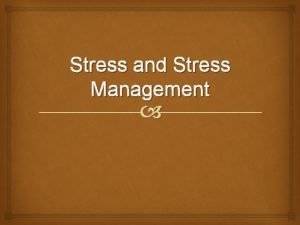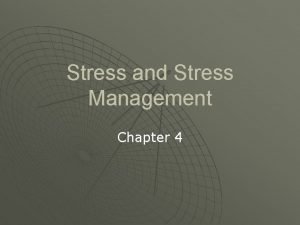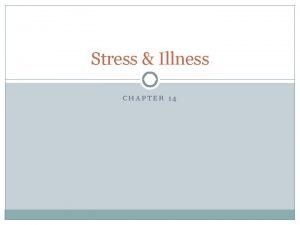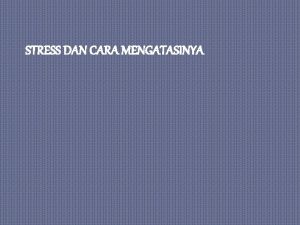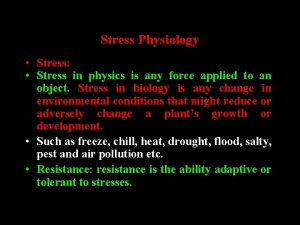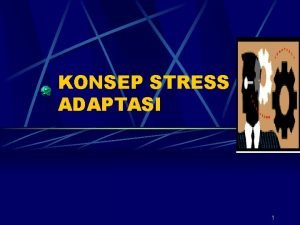PART I STRESS CONCENTRATION 1 Stress concentration l














































































- Slides: 78


PART ”I” STRESS CONCENTRATION

1. Stress concentration l Stress concentration appears in mechanical elements due to sudden change in cross section. l It has negative effects: - Decrease the strength of element. - Tends to crack initiation. l Dimensions of stress raiser.

l It is affected by: - Value of load. - Type of load. - Dimensions & shape of stress raiser.

Shape of Stress Raisers Single Vnotch Single Sharpedge Notch

Curved shoulder Single Semi-circular Notch

Effect of Double notch Shape

Effect of Combined stress (Load Type)

1. Shoulder

2. Single Sharp-edge Notch

3. Single V-shape Notch

4. Single Semi-circular Notch

5. Double V-shape Notch

6. Double Sharp-edge Notches

7. Double Semi-circular Notch

7. Examples of Failed Elements Fatigue failure of a shaft

Pitting corrosion resulting from elevated temperatures on an aluminum housing.

A brittle fracture that originated at a surface defect.

Three conveyor rollers: q. The center one is “as supplied, ” q. The outer two have failed from contact stresses. q. The left roller was case hardened and cracked. q The right roller was unhardened and ductilly deformed.

Fracture due to Torsional effect.

Keyseat distortion Torsional force Keyway deformation due to shaft overloaded.

Ductile deformation due to shaft overloaded.

S t r es s C o n c en t r a t i o n F a c to r

2. Stress Concentration factor: Assume a simple plate (b x t x L). l The plate has a hole of diameter ”d”. l It is under axial force “F”. l Two different stress appears in member. t L l b

- Average stress “ av” - Average stress “ max” L max t av b

3. Stress Raisers: 3. 1 Holes 3. 1. 1 Holes in shafts 3. 1. 2 Holes in plates

3. 2 Notches 3. 2. 1 Notches in shafts 3. 2. 2 Notches in plates

3. 3 Sudden Change of Dimensions 3. 3. 1 900 Angle 3. 3. 2 Stepped Shafts 3. 3. 3 Stepped Plate

4. Relieving stress Reducing of stress concentration in the mechanical members. Factors affecting the efficiency of stress relief • Element (member) dimensions. • Raiser dimensions. • Load (Type, Value, Direction)

Design Considerations R el a t ed T o M a c h i n g

1. Drilling 1. 1 Drilling on inclined surfaces - Avoiding of drilling on inclined surfaces to prevent effect of tangential drilling (Cutting) force.


1. 2. Drilling of holes in relative small heights. X > D/2 H > D/2 X H

2. Tool tolerance for Threading - External Thread - Internal Thread Tolerance undercut External Thread Tolerance undercut Internal Thread

3. Tool tolerance for Milling

X

4. Tool tolerance By Grinding wheel

5. Base for assembly Guide for disc or washer assembly Guide for pin assembly

6. Perpendicular Surfaces Tool - Tip curvature of single point cutting tools deforms the corner of the perpendicular surfaces

3 mm 450 d

2 1 1 X 2 1 2 2 1

7. Pin Hole relationship Sharp Corner 450 x 1. 5

L 2 L L 1

A B L A B

8. Avoiding of shoulder by tapered shaft ends - Hub fixation occurs when the contact surface between hub and both of washer and shoulder.

9. Assembly of Elements on Parallel Surfaces Cover Cylinder - Clearance between cover and cylinder is used.

10. Assembly of Elements on Parallel Surfaces - Partial contact between flat contact surfaces is better to avoid effect of out of flatness or distortion.

11. Bases of flat casting Elements - Bases of casting elements in the same level is recommended.

12. General Recommendations by Casting

- Casting of perpendicular surfaces.

- Casting of wheels with webs.

12. Strengthen of Vertical column

12. Strengthen of Vertical column

12. Strengthen of Vertical column

13. Gear Wheels F F F - Improvement of external gear strength by means of strengthening single (A) or double (B) web.

- Improvement of bevel gear strength.

13. Bolts Connections - M 1 : M 8 Each 1 - M 8 : M 24 Each 2 L 1 0. 8 d Bolts series - M 48 Each 4 H (bolt Head) = 0. 7 d H (Nut) = 0. 8 d L 1 = Variable Design- Make Nuts and bolts 0. 7 d - M 24 : M 48 Each 3 2 d 5 d d 1.


Bolts Connections 1) Hole drilling Drill Work Piece L 1 : Hole Depth

Bolts Connections 1) Hole drilling 2) Thread Cutting L 2 : Thread Depth L 3 : Bolt Thread Depth Thread Cutting tool

13. Bolts Connections 1) Hole drilling 2) Thread Cutting 3) Bolt (Stud) assembly.


Steps of Stud Assembly Washer Nut

A. Through Bolt DHole = 1. 2 Dbolt • Bolt is under tension. • Elements are under compression.

B. Tap Bolt • Upper part has a hole (1. 2 d) • Lower part is threaded. • Connection occurs due to the mutual forces between: • 1 - Contact between Bolt head and surface of upper part. • 2 -Teeth of the bolt end

C. Stud Consist of two threaded parts and a cylindrical neck. One end is assembled in the base element and the other element is pressed by a net assembled in the other bolt end. Hole diameter of the upper part is (1. 2 d).

Relative Dimensions of Hole and Bolt D : Bolt Diameter ( D=30 For Bolt M 30) H 1 = 0. 8 D ( Nut Height) t (Washer height) = 0. 15 D D 2 = 2 D ( Washer Biggest width) A = 3 D ( Min. Surface of contact width) L 1 = 2 D +1. 25 (Thread of bolt length) L 2 = L 1 + 0. 25 D (Hole thread length) L 3 = L 1 + 0. 4 D (Hole depth)

Washer placed under nut.

Pressure



A=2 D


Applications

Belts & Pulleys

Belts & Pulleys

Belts & Pulleys Design- 3 D CONVEYOR ANIMATION - FINAL PROJECT -

END
 Concentration gradient vs concentration difference
Concentration gradient vs concentration difference Movement of high concentration to low concentration
Movement of high concentration to low concentration Levdtwwliqo -site:youtube.com
Levdtwwliqo -site:youtube.com Stress concentration
Stress concentration Efatigue stress concentration factor
Efatigue stress concentration factor Axial load calculation example
Axial load calculation example Chapter 10 stress responses and stress management
Chapter 10 stress responses and stress management True stress vs engineering stress
True stress vs engineering stress Normal axial stress
Normal axial stress Brainpop ratios
Brainpop ratios Part by part technical description example
Part by part technical description example Part part whole addition
Part part whole addition What are the basic display parts of the bar
What are the basic display parts of the bar Unit ratio definition
Unit ratio definition 미니탭 gage r&r 해석
미니탭 gage r&r 해석 The part of a shadow surrounding the darkest part
The part of a shadow surrounding the darkest part Concentration= moles/volume
Concentration= moles/volume How to find percent concentration
How to find percent concentration Concentration of solution
Concentration of solution Concentration in chemical reaction
Concentration in chemical reaction Sedimentation technique for stool concentration
Sedimentation technique for stool concentration Alveoli location
Alveoli location The movement of particles from high to low concentration
The movement of particles from high to low concentration Faraday's constant electrochemistry
Faraday's constant electrochemistry Units for concentration
Units for concentration Proh sub corr facil-alcohol/drug/phone/tobacco
Proh sub corr facil-alcohol/drug/phone/tobacco Concentration camps vs internment camps venn diagram
Concentration camps vs internment camps venn diagram A breath test reflects the alcohol concentration in the:
A breath test reflects the alcohol concentration in the: Gradient de concentration
Gradient de concentration Difference between focus and concentration
Difference between focus and concentration Grams to.moles
Grams to.moles How to determine concentration of a solution
How to determine concentration of a solution Concentration molaire
Concentration molaire Novec 123
Novec 123 Fasting plasma glucose concentration
Fasting plasma glucose concentration Mac maximum allowable concentration
Mac maximum allowable concentration Bradford assay
Bradford assay Client concentration
Client concentration Chemical energy
Chemical energy Carrier concentration in intrinsic semiconductor
Carrier concentration in intrinsic semiconductor Camp de concentration sachsenhausen visite
Camp de concentration sachsenhausen visite The four-firm concentration ratio
The four-firm concentration ratio Intrinsic carrier concentration
Intrinsic carrier concentration Are concentration and molarity the same
Are concentration and molarity the same Solute concentration
Solute concentration Inhalation anesthetics
Inhalation anesthetics Concentration
Concentration Duhring's rule
Duhring's rule Ap concentration examples
Ap concentration examples The average zinc concentration recovered from a sample
The average zinc concentration recovered from a sample Regulating blood glucose
Regulating blood glucose Lesson 80 bearly alive solution concentration
Lesson 80 bearly alive solution concentration Transmittance and concentration relationship
Transmittance and concentration relationship Concentration ratio
Concentration ratio Concentration
Concentration Concentration mass volume triangle
Concentration mass volume triangle Molarity measurement
Molarity measurement Multi-segment marketing
Multi-segment marketing Describe the cash concentration strategies.
Describe the cash concentration strategies. Concentration
Concentration Single segment concentration
Single segment concentration How to find percent concentration
How to find percent concentration Calculating molarity
Calculating molarity Formal ether concentration technique
Formal ether concentration technique Moles concentration volume triangle
Moles concentration volume triangle Enzyme
Enzyme Quantitative expression of solution concentration
Quantitative expression of solution concentration Blood alcohol concentration (bac)
Blood alcohol concentration (bac) Activity to concentration
Activity to concentration Intracellular k concentration
Intracellular k concentration Molarity
Molarity Ligation
Ligation Ketamine concentration
Ketamine concentration Dilution in pharmacy
Dilution in pharmacy Lesson 80 bearly alive solution concentration
Lesson 80 bearly alive solution concentration Properties of solutions grade 7
Properties of solutions grade 7 K equilibrium formula
K equilibrium formula Ww concentration
Ww concentration Carbon dioxide concentration in photosynthesis
Carbon dioxide concentration in photosynthesis
